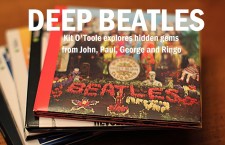During the Beatles years, George Harrison grew rapidly as a songwriter. He often dealt with philosophical themes of living for the moment and renewal. In “Love You To,” Harrison rails against people “who’ll screw you in the ground” and “fill you in with their sins.” A precursor to “Love You To,” “Think for Yourself” tells the story of a man distancing himself from someone who has lied and wreaked emotional havoc. Accented by Paul McCartney’s fuzz bass, the song not only reveals Harrison’s darker side, but foreshadows the thematically sophisticated tracks he would pen on subsequent Beatles albums as well as his solo works.
The inspiration for the bleak lyrics is unclear; in his autobiography I Me Mine, George Harrison wrote that he did not remember a specific incident that preceded the song. “‘Think For Yourself’ must be written about somebody from the sound of it — but all this time later I don’t quite recall who inspired that tune. Probably the government,” he said. Originally titled “Won’t Be There with You,” Harrison and the Beatles recorded the song in one session on November 8, 1965. After recording the rhythm guitars, drums, and bass in one take, they overdubbed lead guitar, additional bass (the sound wired through a fuzz box), and additional percussion. They then overdubbed the lead and backing vocals, which produced an interesting artifact: over 20 minutes worth of studio chatter caught on tape.
As the Beatles and George Martin rushed to complete Rubber Soul in time for the holiday shopping season, they also had to produce the annual fan club Christmas record. Thus, Martin kept the tape running during initial rehearsals, hoping to capture witty banter. According to Mark Lewisohn’s The Complete Beatles Recording Sessions, the Beatles were well aware of being recorded, and therefore hammed it up with fake accents and in-jokes. Nothing came out of these sessions that could be used on the Christmas flexidisc, so Martin scrawled “this will eventually be issued” on the tape box for safekeeping. Two years later, George Martin resurrected the tape for the producer of the Yellow Submarine animated film. In the finished movie, six seconds of audio footage from the “Think for Yourself” session was incorporated into a scene.
During the session, John Lennon played the Hammond organ and tambourine; Paul McCartney played the Hofner bass and Epiphone Casino; George Harrison played a Sonic Blue Fender Stratocaster; and Ringo Starr played his Ludwig drums and shook maracas. Harrison assumed lead vocals while also performing backing harmonies with Lennon, and McCartney. As Harrison explained in Anthology, the fuzz box originated from a Phil Spector session: While recording “Zip-A-Dee-Doo-Dah” by Bob B. Soxx and the Blue Jeans in 1963, the engineer accidentally overloaded the microphone on the guitar player. A distorted sound resulted, which Spector loved. Years later, according to Harrison, so many artists wanted to replicate the distortion that a fuzz box was invented. “We had one and tried the bass through it and it sounded really good,” he said. To achieve this, McCartney played his Epiphone Casino through the fuzz box, then doubled his bass part, according to Kenneth Womack’s Beatles Encyclopedia.
As McCartney’s buzzing bass cuts through the track like a chainsaw, Harrison reveals his disdain for an unnamed person. “I left you far behind, the ruins of the life that you had in mind,” he snarls. Apparently the narrator has tried to convince the person to change his/her ways, but “I know your mind’s made up, you’re gonna cause more misery.” Interestingly, Harrison later suggests that time has not run out for the person to atone for his/her sins “Try thinking more, if just for your own sake” he pleads. The future still looks bright, Harrison sings, and “you’ve got time to rectify all the things that you should.” However, he holds little hope for the person, thus he distances himself from the person’s actions. Think for yourself, Harrison concludes, for he will have nothing more to do with him/her.
Who was Harrison addressing? The answer remains unclear. What is evident, however, is that Harrison’s skill as a songwriter was developing at an incredibly fast rate. Think of “Think for Yourself” as the precursor to “Taxman,” “Love You To,” “Within You Without You,” and “Piggies” for its introspective and biting elements. McCartney’s bass and Starr’s percussion enhance the lyrics’ harsh undercurrent – something that’s particularly noticeable in the attached instrumental version.
Rubber Soul marks a significant shift in the Beatles’ sound, which involved increased experimentation in sound, structure, and lyrical content. While not as well known as other Rubber Soul tracks like “Norwegian Wood” or “Michelle,” George Harrison’s “Think for Yourself” embodies Beatles 2.0, their move away from the “moptop” image and toward artistic maturity.
- How John Lennon Came Roaring Back on the Beatles’ White Album - November 22, 2023
- Five ‘With the Beatles’ Deep Cuts That Illustrate Their Lasting Debt to R&B - November 20, 2023
- Five Must-Hear Deep Cuts from the Beatles’ ‘Past Masters’ - March 7, 2023


